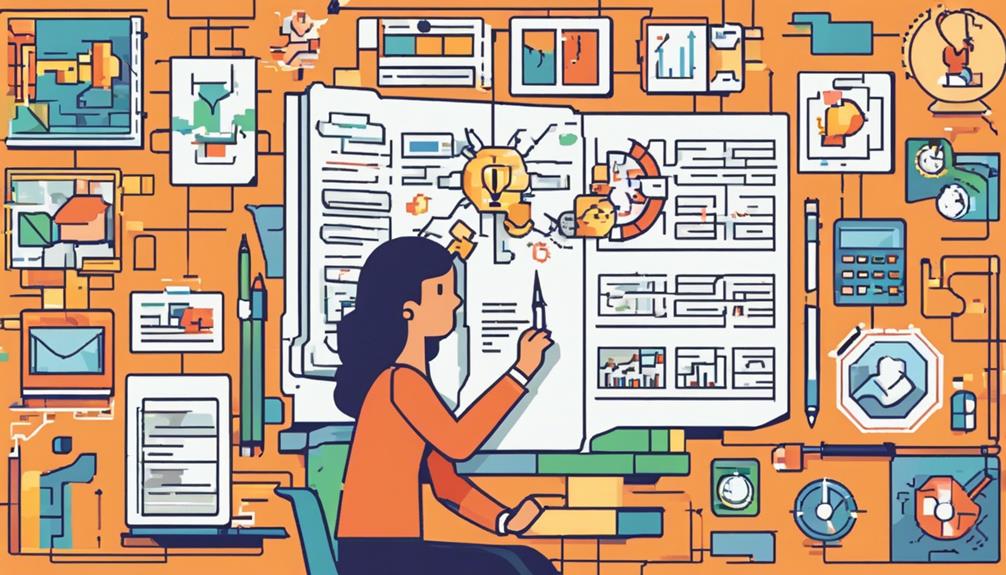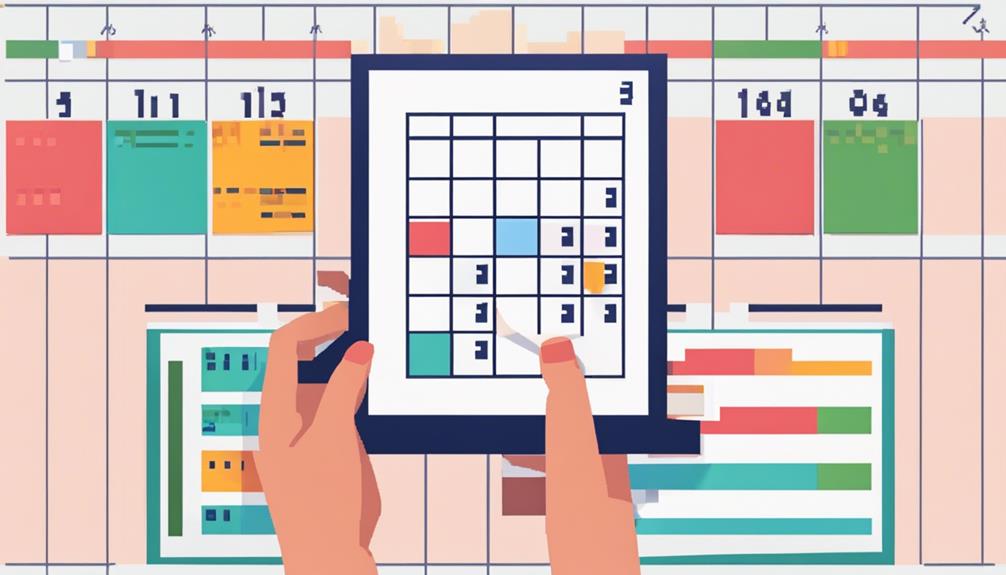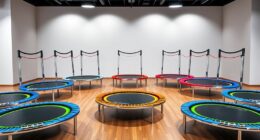To enhance your self-improvement efforts, start by creating a personal development plan. Define specific goals with actionable steps to track progress effectively. Prioritize tasks based on importance and urgency for maximum impact. Utilize hands-on learning methods to apply theoretical knowledge practically and foster skill development. Network with industry professionals to gain insights, expand connections, and explore career possibilities. Seek mentorship for valuable guidance and support. Access self-help resources like books, articles, seminars, and conferences for continuous growth. Stay tuned for more valuable insights on key activities for self-improvement.
Key Takeaways
- Set SMART goals for clear direction and motivation.
- Prioritize tasks for self-improvement goals.
- Engage in continuous learning for skill enhancement.
- Network for career development and insights.
- Track progress and celebrate achievements.
Personal Development Plan Overview
Craft a Personal Development Plan Overview that serves as your roadmap for growth and success. Your personal development plan outlines the goals you want to achieve and the skills you need to enhance to reach those objectives.
By mapping out a clear plan, you can focus on specific areas of improvement, track your progress, and make necessary adjustments along the way.
Setting SMART goals is essential in developing an effective personal development plan. These goals should be Specific, Measurable, Achievable, Relevant, and Time-bound to provide you with a clear direction and motivation for your self-improvement journey.
With a well-defined personal development plan, you gain clarity, stay motivated, and have a clear sense of direction in both your personal and professional life.
Prioritizing your goals, leveraging your strengths, addressing weaknesses, and committing to continuous self-improvement are all key components of a successful personal development plan.
Setting Specific Goals

When setting specific goals, defining clear, measurable objectives is crucial for personal growth. These goals provide direction and focus for your self-improvement journey.
Make sure your goals are detailed to track progress effectively and create actionable steps.
Goal Setting Strategies
Setting particular goals is a necessary step in your personal development journey, providing a clear roadmap for your growth and progress. To guarantee your goals are effective, it's important to employ goal setting strategies that focus on creating measurable and specific objectives.
By setting particular goals, you give yourself a clear direction and focus for your self-improvement activities. These goals enable you to track your progress, determine your success, and stay motivated along the way.
Additionally, specific goals help in prioritizing tasks, making sure that you allocate your time and resources efficiently towards achieving them. The act of setting particular goals not only increases your motivation but also enhances your sense of accountability in working towards your personal growth.
Make sure your goals are clear, measurable, and directly related to the areas you want to improve, allowing you to make steady progress and celebrate your achievements.
SMART Goal Criteria
Focusing on specific goals is essential for guiding your personal development journey effectively and measuring your progress accurately. Personal growth thrives on setting specific goals that provide a clear direction and serve as the foundation of your action plan. Specific goals are like a roadmap, detailing who's involved, what needs to be achieved, where it will happen, when it should be completed, and why it matters to you.
By defining your objectives with clarity and detail, you eliminate ambiguity and pave the way for success in your personal development endeavors.
These specific goals not only enhance motivation and accountability but also bring a level of precision to your action plan. With clear goals in place, you can measure your progress effectively, staying on track towards realizing your desired outcomes.
Embrace the power of setting specific goals to propel your personal growth journey forward with purpose and direction.
Tracking Progress Effectively
To effectively track your progress in personal development, make sure your goals are specific and measurable. Setting specific goals is essential as they provide clarity and direction, making it easier to measure your success.
When your goals are clear and specific, you can identify actionable steps to achieve your desired outcomes. By having measurable goals, tracking your progress becomes more manageable. These specific goals act as benchmarks for measuring your achievements and help you stay on track with your personal growth journey.
Prioritizing Key Activities

Identifying the most crucial tasks aligned with your personal development goals is pivotal when prioritizing key activities. To achieve your goals effectively, it's essential to focus on the tasks that will have the most significant impact on your self-improvement journey.
By prioritizing key activities, you can guarantee that you're making progress efficiently and avoiding distractions. Evaluating the urgency and importance of each task helps determine what needs immediate attention and what can be tackled later. This process allows you to allocate your time and energy wisely, staying on track with your personal development plan.
Prioritizing key activities not only aids in managing your time effectively but also assures that you're consistently moving forward towards your goals. By staying focused on the most vital tasks, you can make steady progress and maintain momentum in your self-improvement journey.
Creating an Action Plan

Craft a detailed action plan to outline the specific steps needed for achieving your self-improvement goals. By creating a personal development plan, you can break down your aspirations into actionable tasks. To help guide you through this process, consider the following example:
| Components | Description | Benefits |
|---|---|---|
| Identify Goals | Define what areas you want to improve in. | Provides clarity and direction. |
| Break Down Goals | Divide larger goals into smaller, manageable tasks. | Makes progress more achievable. |
| Set Deadlines | Establish timelines for each task. | Keeps you focused and on track. |
| Accountability | Track progress and seek feedback from others. | Secures responsibility and support. |
| Review and Adjust | Regularly evaluate and adapt the action plan. | Maintains effectiveness and adjusts to changes. |
Crafting your action plan using these steps will set you on the path towards achieving your self-improvement goals effectively.
Tracking Progress

Regularly monitoring and evaluating your progress towards personal development goals is essential for staying on track and making necessary adjustments. To effectively track your progress, make use of the following strategies:
- Keep Track Using Tools: Utilize progress trackers, journals, or apps to monitor your daily actions and milestones achieved. These tools provide a tangible record of your journey towards self-improvement.
- Reflect on Achievements and Setbacks: Take time to reflect on both your successes and challenges. By acknowledging achievements, you stay motivated, while recognizing setbacks helps in identifying areas needing improvement.
- Provide a Sense of Accomplishment: Tracking progress provides a sense of accomplishment by showing how far you've come. Seeing tangible results and milestones achieved can boost motivation and keep you focused on your personal development goals.
Professional Development Strategies

To boost your professional development, consider implementing skill enhancement strategies like workshops and skills-based practice.
Engaging in networking opportunities through industry associations and online media can broaden your connections.
Utilizing continuous learning methods such as mentorship and self-assessment will help you stay ahead in your career.
Skill Enhancement Strategies
Enhance your professional skills through a combination of formal training, networking, hands-on learning, conference attendance, and online resources.
Formal Training: Engage in workshops, industry associations, and online courses to develop new skills and stay updated with industry trends. These structured programs provide a foundation for your professional development plan and offer certifications that boost your credibility.
Hands-On Learning: Challenge yourself with real-world scenarios and skills-based practice. This practical approach allows you to apply theoretical knowledge in real-life situations, fostering experiential skill development and enhancing your problem-solving abilities.
Continuous Learning: Embrace online resources to engage in ongoing learning. Platforms such as webinars, podcasts, and e-books offer convenient ways to expand your knowledge base and acquire new skills on the go. This commitment to continuous learning ensures you remain relevant in a rapidly evolving professional landscape.
Networking Opportunities
Considering professional development strategies, industry associations and workshops provide valuable networking opportunities essential for growth in your career. By actively participating in these networking opportunities, you can expand your professional network, gain insights from industry experts, and discover new career possibilities. Engaging in networking interactions through industry associations allows you to connect with like-minded individuals, exchange ideas, and potentially collaborate on projects. Attending workshops and conferences not only enhances your knowledge and skills but also offers a platform to meet potential mentors or partners. Below is a table highlighting the benefits of networking opportunities in professional growth:
| Networking Opportunities | Benefits |
|---|---|
| Industry Associations | Expand professional network |
| Workshops and Conferences | Gain insights from experts |
| Networking Interactions | Collaborate on projects |
| Online Media Usage | Discover new career possibilities |
| Experiential Development | Meet potential mentors or partners |
Continuous Learning Methods
Engage actively in various forms of professional development to continuously enhance your skills and knowledge. Here are some effective methods to promote continuous learning and personal growth:
- Formal Development: Take part in workshops, courses, and certifications tailored to enhance your professional skills. These structured programs provide in-depth knowledge and practical tools to excel in your field.
- Social Development: Engage in networking events and join industry associations to expand your connections. Building a strong network opens up new opportunities for collaboration, mentorship, and career advancement.
- Experiential Development: Challenge yourself with real-world scenarios and practice skills in hands-on settings. By immersing yourself in practical experiences, you can sharpen your abilities and gain valuable insights for personal growth.
Career Advancement Tips

To advance your career effectively, prioritize networking and seeking mentorship to open up new opportunities for growth. Establishing connections within your industry can lead to valuable insights and potential career advancements. Mentorship offers guidance from experienced professionals, helping you navigate challenges and make informed decisions to progress in your career.
Additionally, engaging in continuous learning through workshops, courses, and certifications is essential for professional growth. These educational opportunities enhance your skills and knowledge, making you more competitive in the job market.
Furthermore, experiential development plays a significant role in career advancement. Challenging yourself with new tasks and acquiring additional skills can set you apart from your peers and open doors to new opportunities. Attending industry-specific conferences and workshops provides a platform for networking and staying updated on industry trends, contributing to your career growth.
Job Application Preparation

Crafting a tailored resume can help you showcase your relevant skills and experiences effectively, increasing your chances of catching the eye of potential employers.
Enhancing your online presence on professional networking platforms allows you to highlight your qualifications and expertise, making you more visible in the job market.
Preparing responses to common interview questions is essential for excelling in job interviews and securing the job that aligns with your career goals.
Resume Tailoring Techniques
Tailoring your resume to match the job requirements and highlight your relevant skills and experiences can greatly enhance your chances of securing a job interview.
To effectively tailor your resume, consider the following techniques:
- Study the Job Description: Analyze the job posting to understand the key skills and experiences sought by the employer. Tailor your resume to reflect these requirements.
- Use Relevant Keywords: Incorporate industry-specific keywords from the job description into your resume. This can help your resume get noticed by applicant tracking systems (ATS) and recruiters.
- Quantify Your Achievements: Instead of listing generic job duties, focus on quantifiable accomplishments that demonstrate your skills and contributions. Numbers and metrics can make your resume more compelling.
Interview Preparation Strategies
When preparing for an interview as part of your job application process, make sure you thoroughly research the company and position to tailor your responses effectively. Familiarize yourself with the organization's values, goals, and recent achievements to demonstrate your genuine interest.
Practice common interview questions to build confidence and articulate your responses clearly. Use specific examples from your experiences to showcase your skills and highlight your achievements. Dress professionally and arrive early on the interview day to make a positive first impression.
During the interview, maintain good eye contact and engage actively with the interviewer. After the interview, don't forget to send a follow-up thank-you note expressing your appreciation for the opportunity and reiterating your enthusiasm for the position. A well-crafted thank-you note can leave a lasting impression and demonstrate your professionalism and commitment to the role.
Personal Growth Tools

To enhance your personal growth journey, consider utilizing a variety of resources like books, online courses, mobile apps, and professional coaching services. These tools can help you explore different personal development categories, such as leadership skills, communication techniques, and time management strategies. By engaging with these tools, you can develop skills that are crucial for your personal and professional growth.
- Examples of Personal Development:
Through books and online courses, you can access a wealth of knowledge on personal growth topics like emotional intelligence, productivity hacks, and mindfulness practices.
- Develop Skills:
Mobile apps offer interactive ways to learn new skills, track progress, and stay motivated on your personal growth path.
- Clear Plan:
Professional coaching services can provide personalized guidance, tailored action plans, and accountability to make sure you're making consistent progress towards your goals.
Self-Improvement Resources

Explore a variety of self-improvement resources to enhance your personal development journey.
Online courses offer convenient ways to improve skills in leadership, communication, and time management. These courses provide structured learning and practical tools for immediate application in your personal growth journey.
Engage with professional networking groups to connect with individuals who share your goals, providing support and guidance for your self-improvement endeavors.
Mentorship opportunities offer valuable insights and advice from experienced individuals, guiding you towards enhancing your personal development effectively.
Additionally, reading self-help books and articles can provide knowledge and inspiration, fueling continuous self-improvement efforts.
Attending seminars and conferences focused on personal growth and development can further expand your skill set and mindset, offering new perspectives and strategies for your journey of self-improvement.
Frequently Asked Questions
What Is the Plan of Action for Self Development?
To create a plan for self-development, identify specific goals and key activities. Set measurable steps like workshops, courses, or mentorship. Dedicate yourself to consistent actions and habits. Regularly evaluate and adjust your plan for continuous growth.
What Are Your Plans of Action to Make Yourself Better?
To make yourself better, start by setting clear goals, creating a daily routine with activities like reading and exercising, keeping a journal, seeking feedback, and staying open to new opportunities. Consistency and discipline are key.
How Do I Write a Self Growth Plan?
To write a self-growth plan, you identify strengths, pinpoint areas for growth, set clear goals, create a detailed action plan, implement supportive habits, monitor progress regularly, adjust when needed, and celebrate successes to stay motivated.
How to Write a Self-Improvement Plan?
To write a self-improvement plan, start by identifying areas for growth. Set SMART goals, create an action plan with steps, use progress trackers, and adjust as needed. Consistent evaluation and accountability will help you stay on track.
What Key Activities Should I Include in My Self-Improvement Growth Plan?
When creating your self-improvement growth plan, it’s essential to consider specific candidate growth plan focus areas. These may include setting achievable goals, learning new skills, developing a solid exercise routine, and cultivating a positive mindset. Focusing on these areas can help guide you towards personal and professional growth.
Conclusion
Now that you have your action plan for growth in place, get ready to begin on your journey towards self-improvement.
It's time to get your hands dirty, immerse yourself, and watch yourself blossom into the best version of yourself.
Remember, the path to success isn't always smooth, but with determination and perseverance, you'll overcome any obstacles that come your way.
Embrace the challenges, learn from the setbacks, and keep pushing forward towards your goals.
You've got this!










